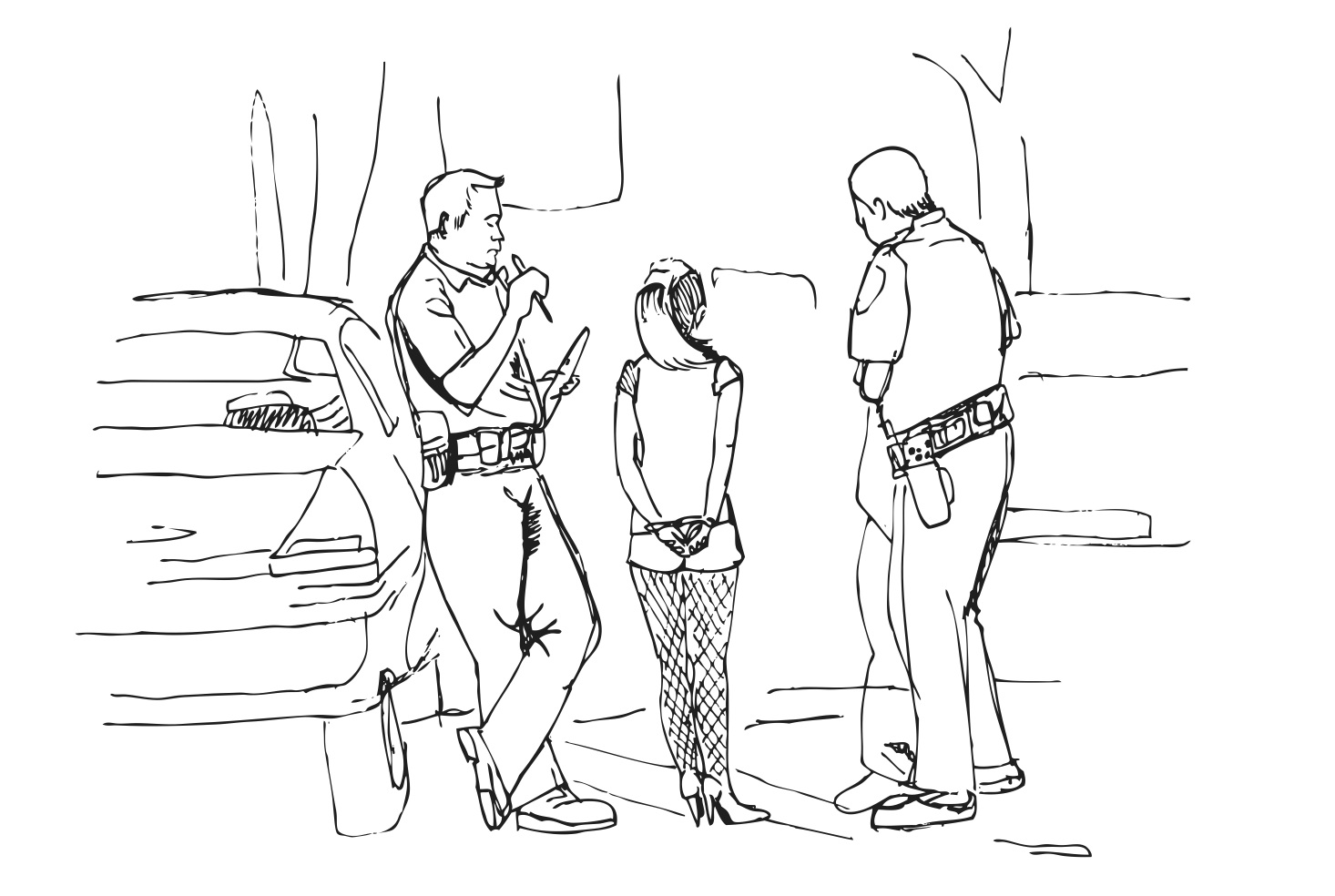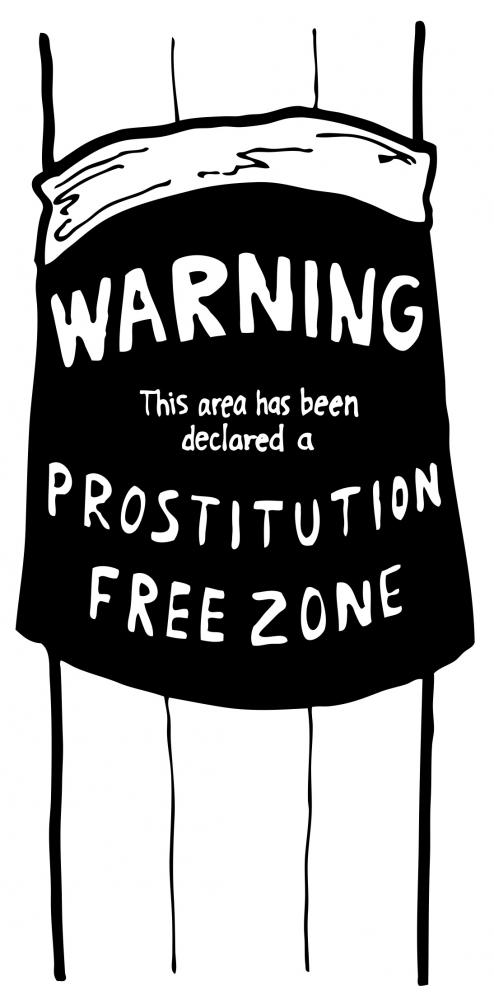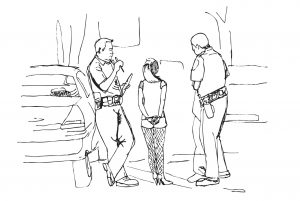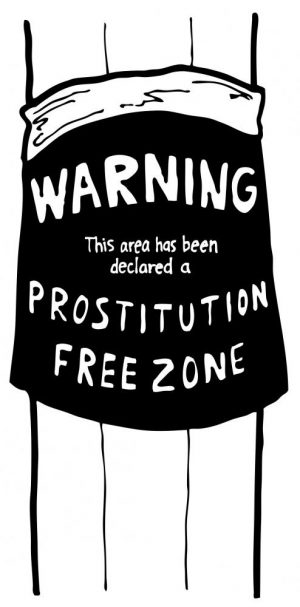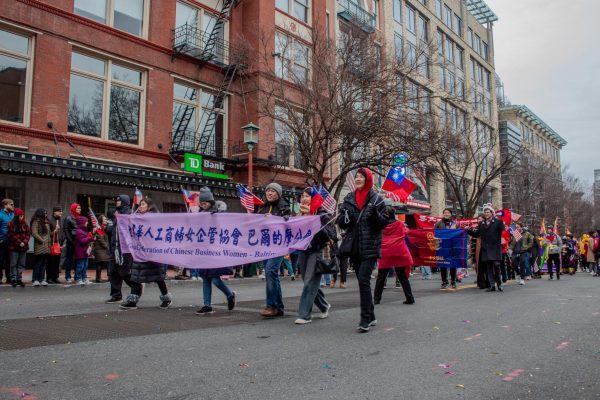The District After Dark: Keeping Sex Workers on the Street
Helping Individual Prostitutes Survive, commonly known as HIPS, sends an outreach van down those streets at night, providing sex workers with safe sex materials, harm reduction tips, hot chocolate, candy and a friendly face.
HIPS meets sex workers “where they’re at” and does not pass judgement on the individuals they work with. They exist to give the workers support in the decisions they make whether they continue to engage in sex work or try to get off the streets.
However, some sex workers find themselves in a cycle of structural violence that makes getting off the streets almost impossible. Cyndee Clay, executive director of HIPS, spoke to this reality.
“One individual actually had a misdemeanor of prostitution 12 years ago who got fired from a food service job,” Clay said. “What we’re looking at is a tragic cycle of incarceration, being back on the streets and not being able to find employment, but still being faced with some way they have to pay their bills, some way to feed their children, some way to feed themselves.”
The transgender community is particularly prone to unemployment due to discrimination. “Trans people also face self-reinforcing cycles of poverty leading to disparities in the areas of employment, education, healthcare and housing,” said Alison Gill, a member of the DC Trans Coalition. “This is particularly true for trans women of color. An unfortunate number of trans women find that the only way they can survive is by engaging in sex work.”
***
This world isn’t far removed from the residents near and around Eastern Avenue. Andina Keith, member of Citizens Against Prostitution, is tired of the prostitution that spills over from Eastern Avenue into her community of Fairmont Heights. She says residents have barricaded their driveways with chains and trashcans to discourage prostitution in their yards.
“We are not a truck stop that you see in the movies, we’re not a red light district, we’re not a warehouse community,” Keith said. “We are a small community with a very small police department that has to deal with all of the ills that flow from Washington DC. Church lots, front yards, back yards, sides of homes, steps, backs of alleys are all used as an open motel.”
Keith says one girl had to have her bus stop changed off Eastern Avenue because she was asked by a “john,” the name used for men who hire prostitutes, if she was for hire. Families raising children in the neighborhood such as Nakkiyah Gant in Ward 7 have voiced particular concern about prostitution in their community. Understandably, families are concerned about what their children might be exposed to.
DC City Councilmember Yvette Alexander is tired of hearing about the prostitution problem in Ward 7 she says affects her constituents’ quality of life. In response, she’s proposed an amendment that seeks to give the Chief of Police for the Metropolitan Police Department the power to declare permanent prostitution-free zones, or PFZ’s.
The Chief of Police was given the power to declare PFZ’s for a maximum of 10 days in 2006, the same year the Council criminalized prostitution. Prior to 2006, only solicitation was illegal. PFZ’s give the police department the power to order two or more people to disperse who they reasonably believe are congregating “for the purpose of engaging in prostitution or prostitution-related activities.” If those congregating fail to disperse, the MPD has the power to arrest them. To date, no arrests have been made for failure to disperse, and PFZ’s can now last up to 20 days.
While the entire District is technically supposed to be prostitution-free, Councilmember Phil Mendelson explains the purpose of the zones.
“These are specific areas where there has been a chronic problem of street prostitution,” Mendelson said. “Once the prostitution free zone is declared and posted, the police have the ability to prevent prostitutes from congregating or having discussions with potential customers.”
The idea behind PFZ’s is that if police control and put more resources into that area for a short period of time, business will be disrupted. Alexander says she doesn’t believe it has been successful in her ward and complains it can take a whole year to get another PFZ declared.
“Twenty days is not long enough,” she said. “As soon as that 20 days is up, that activity happens again.”
Alexander’s measure is unlikely to pass though, due to constitutional concerns. The DC Attorney General’s office has “substantial concerns” about the constitutionality of the law already in place, and making the zones permanent could exacerbate these concerns according to Ariel Levinson-Waldman, senior counsel to the DC Attorney General. The reason for this concern—which the Attorney General’s office addressed before the act passed in 2006—is that under the current legislation, intent to violate the law is not an element of the offense.
Alexander’s proposed amendment does not remedy this.
“Without specifying as an element of the crime that the defendant have intent to engage in a specific criminal act, such as solicitation of prostitution, courts have generally held the statue to be unconstitutionally vague,” Levinson-Waldman said. If brought to court, Alexander’s amendment would almost certainly not hold up and the American Civil Liberties Union would likely sue, according to Rick Rosendall of Gay and Lesbian Activist Alliance. In an interview with The Washington Post, Alexander all but conceded defeat.
The transgender community and its allies believe the issue of profiling is another concern with legal implications.
“There is a very widespread reporting that we’re getting from the community that members of the community feel profiled,” Rosendall said. “I began this conversation with the police department in the late 90’s about the fact that we’re continually hearing from transgender individuals that they are presumed by officers to be prostitutes merely because of their personal appearance, which is a violation of the DC Human Rights Act.”
Alison Gill, a member of the DC Trans Coalition, thinks PFZ’s allow officers to unfairly target the trans community.
“Many trans people gather in areas frequented by other trans people including sex workers and think of these areas as spaces of work, community organization and organizational outreach,” Gill said. “These areas are especially likely to be named PFZ’s since the police often equate trans women with sex workers. This leads to persecution of trans communities, pushing them to less safe areas of the city.”
***
Constitutional and legal concerns aren’t the only reasons opponents object to PFZ’s and their expansion. Some argue PFZ’s don’t work and only push sex workers to the outskirts of the city, into more dangerous neighborhoods. Cyndee Clay from HIPS says her numbers back this up. A WAMU report says the arrests in Ward 2, where downtown DC is housed, have gone down 10 percent and arrests in Ward 7, Alexander’s Ward, have more than tripled based on the District’s crime data.
“And since the enactment of the free zones, we’ve had to go out into larger areas of the community,” Clay says. “We’ve both experienced more violence that our clients have faced and also what my outreach workers have faced. Our van was shot at three or four times within a year and a half after the free zones were enacted in the center of the city.”
Clay also says a lot of the sex workers aren’t aware when a PFZ is declared.
“Another thing that we’ve found from our conversations with people out on the streets: people aren’t often entirely aware of the fact that there’s a free zone enacted,” Clay said. “When we actually tried to get testimony from people who had been affected by the free zones, many of them weren’t able to articulate when it was just regular law enforcement activity and when it was specific around free zone activity. They just knew an officer told them that they had to move on, so they had to move on.”
Peter Newsham, Assistant Chief of the Investigative Services Bureau, says the impact of the zones is hard to pinpoint, but that his arrest numbers show the opposite trend. He also says there’s an overall decrease in arrests for street prostitution, but it can’t necessarily be attributed to PFZ’s.
“Prostitution in the District of Columbia used to be more of a street level problem; however, the prevalence of the Internet and other social media has driven a lot of prostitution behind closed doors, including hotels, illegal massage parlors and brothels, where it is easier to avoid law enforcement scrutiny,” Newsham said.
***
Maybe the way to get people off the streets isn’t to increase the penalties for repeat offenders, like the DC Council did in 2009, or increase the law enforcement like some are trying to do now. Perhaps the solution has more to do with reducing barriers and increasing programs to help sex workers find other options.
“Diversion programs are being cut from the city, HIV prevention programs specifically for this population are being cut from the city, and programs that are really out there working 24/7,” Clay said. “So, you’re increasing our law enforcement response to the issue while at the same time you are decreasing the number of social services and programs that are really designed to help people off the streets. We feel like this is just a really bad investment in our community.”
Clay says one program HIPS worked on with the court had a 80 percent graduation rate and a 90 percent non-recidivism rate before it was cut about a year ago. To Clay, it doesn’t make sense to cut these resources and then ask for a greater criminal response to the issue.
Newsham agrees that the problem needs to be addressed at a deeper level.
“You have problems that the people who are involved in the conduct almost exclusively have drug, alcohol addictions and mental illness concerns,” Newsham said. “I would think that to really eliminate or to have some impact on that ongoing problem in that area, you have to address those concerns. We have at our disposal laws to address and make arrests, but I’m not necessarily convinced that arrests have [had a major impact] on the problem in that particular area.”
While Alexander says she supports a comprehensive approach, it’s not unreasonable to question that commitment. She doesn’t seem to be taking it very seriously when she leans over to whisper something in Councilmember Mendelson’s ear, laughing while an opponent testifies. It seems that policymakers are more concerned with removing sex workers from certain wards than they are with actually finding a constructive solution. It’s unlikely Alexander will drop the issue once her amendment fails to pass, but what approach she takes next will be telling to her intentions.
“In some person’s eyes, it has worked because they don’t deal with the plight in their communities where they live because the zones were put in place,” Alexander said. “So you can’t tell them that it doesn’t work. As long as you don’t see the problem in front of you then it’s fine with them.”
Illustrations by Carolyn Becker.


